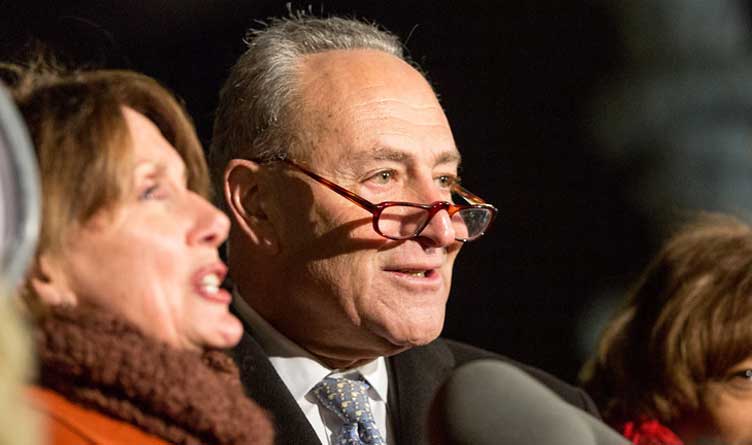While Many Interest Groups Felt They Missed Out On Crucial Aid In Biden’s Relief Package, A Handful Of Industries Scored Huge Wins, Including Healthcare Industry Giants.
Photo: Chuck Schumer & Nancy Pelosi at news conference.
Photo Credit: Lorie Shaull / Flickr
Published March 12, 2021
The Center for Responsive Politics [By Karl Evers-Hillstrom] –
The House passed Democrats’ $1.9 trillion COVID-19 relief bill along party lines Wednesday and President Joe Biden signed the massive spending package Thursday.
The 628-page bill will provide $1,400 stimulus checks, extend expanded unemployment benefits through September and send $350 billion to state, local and tribal governments, among other provisions.
While many interest groups felt they missed out on crucial aid in Biden’s relief package, a handful of industries scored huge wins, including healthcare industry giants.
The bill allocates $34 billion to expand health insurance subsidies through the Affordable Care Act. It will also help subsidize health insurance premiums for workers who lose their jobs.
The move to subsidize insurers, rather than expand government health care, was favored by a coalition of influential industry groups, including America’s Health Insurance Plans, Blue Cross Blue Shield, the American Hospital Association, the American Medical Association as well as the U.S. Chamber of Commerce.
Those groups were among the top lobbying spenders in 2020.
The increased insurance subsidies are a win for insurers, which opposed a “Medicare-X” proposal from Sens. Michael Bennet (D-Colo.) and Tim Kaine (D-Va.) to create a public option.
It’s also a win for providers and hospitals, as private insurance pays far more than government programs.
Healthcare industry groups, whose members are on the front lines of the pandemic, have flexed their influence in Washington over the last year. Lobbying data for the first quarter of 2021 won’t be available until mid-April, but the health sector set new spending records in 2020, spending $615 million to influence Washington. Overall lobbying spending neared a record mark in 2020.
The relief bill will also provide $8.5 billion for rural health care providers. STAT News reported that Sen. Joe Manchin (D-W.Va) pushed for the provision amid lobbying by the West Virginia University Health System.
The nonprofit provider deploys just one lobbyist, Suzanne Bentzel, who previously worked for two other Democratic West Virginia U.S. senators.
Some industry groups didn’t get everything they asked for. The American Hospital Association, which scored numerous wins in previous COVID-19 packages, said it was disappointed Biden’s bill didn’t add more money to the provider relief fund, which has a few billion dollars remaining.
The bill also removes a cap on Medicaid drug rebates, a provision that will hurt the bottom line of pharmaceutical companies. Still, the industry scored a win in the Senate version that Biden will sign, which delayed the policy from going into effect until 2024 rather than 2023.
The pharmaceutical industry spent $306 million on lobbying in 2020, an all-time high figure.
Hard-hit small businesses secure big wins
Democrats threw restaurants a lifeline in the relief package, including a new $28.6 billion fund for restaurants with 20 or fewer locations.
Restaurants launched an aggressive lobbying campaign to get the money.
The National Restaurant Association and the newly formed Independent Restaurant Coalition praised the bill and said Senate Majority Leader Chuck Schumer (D-N.Y.) was “absolutely critical” to securing the grant program, which was left out of Biden’s initial proposal, Politico reported. Bars will also benefit from the fund.
“Our nation’s restaurants, bars and distilleries are in desperate need of relief, and this bill is a great place to start,” the Distilled Spirits Council said in a statement to The Hill.
Restaurant groups also fought to remove the $15 minimum wage proposal that didn’t make it into the final spending package. Sen. Kyrsten Sinema (D-Ariz.), who also pushed for restaurant relief, voted against a measure to include a minimum wage increase.
Venue operators, which had trouble accessing small business loans, also secured billions in new grant funding, according to the Washington Post.
The National Independent Venues Association, launched last year, lobbied for assistance to hard-hit event providers.
In 2020, the group spent $240,000 on a team of lobbyists from Akin Gump, which included former top aides to House Speaker Nancy Pelosi (D-Calif.) and Senate Minority Leader Mitch McConnell (R-Ky.). Amid the pandemic, interest groups have relied on former aides to top congressional leaders to push their priorities.
Airlines, airports get more aid
After emerging as big winners in the $2.2 trillion CARES Act, airlines will receive another $15 billion in aid.
The boost comes after an extensive lobbying and public relations campaign from air transport giants, which met with White House officials in February, and the industry’s top trade group, Airlines for America.
Airline unions joined with their employers in pushing for money, aiming to prevent layoffs with air travel cut in half during the pandemic.
“By passing the American Rescue Plan, tens of thousands of aviation workers will remain on company payroll and off unemployment as intended by this worker-first program,” Capt. Joe DePete, president of the Air Line Pilots Association, said in a statement applauding the bill.
Airports will also get an $8 billion boost, welcome relief for Airports Council International, the industry’s top trade group, which slightly increased its lobbying spending last year. Airports received $10 billion in the CARES Act.
The broader travel industry, however, missed out on aid.
The U.S. Travel Association lamented that Congress did not allow the industry to take more money from the Paycheck Protection Program or create new travel tax credits.
Still, industry players are hopeful stimulus checks and increased vaccine funding will boost tourism. Lobbying activity on Democrats’ stimulus bill will be revealed April 20, when groups reveal their first-quarter spending figures.
The CARES Act and House Democrats’ HEROES Act — which included many provisions that made it into this year’s bill — are the second and fourth most lobbied bills of all time, excluding appropriations bills.
About the Author:

Karl joined the Center for Responsive Politics in October 2018. As CRP’s money-in-politics reporter, he writes and edits stories for the news section and helps manage a team of diligent writers.
A native of Brooklyn, New York, Karl graduated from State University of New York at New Paltz in 2016 with a B.A. in journalism. He previously worked at The Globe, a regional newspaper based in Worthington, Minnesota.





